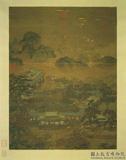元人法書 冊 張雨書聽泉亭絕句
推薦分享
資源連結
連結到原始資料 (您即將開啟新視窗離開本站)後設資料
- 資料識別:
- 故書000257N000000011
- 資料類型:
- 類型:書法
- 型式:文字
- 著作者:
- 張雨
- 出版者:
- 數位化執行單位:國立故宮博物院
- 格式:
- 本幅 29.6x14.2公分、全幅 50.8x73.9 公分
- 語言:
- 漢文
- 關聯:
- 石渠寶笈初編(重華宮),下冊,頁712-714&*故宮書畫錄(卷三),第一冊,頁252-253&*故宮歷代法書全集,第十六冊,頁68-91、173-179&*張雨(西元一二八三-一三五0年),字伯雨,號句曲外史,浙江錢塘人。元代著名的道教人物。文才清麗,書畫清逸,倪瓚稱其詩文字畫為「道品第一」。 整幅書作,用筆頓挫分明,俊爽清遒。結體圓實,行筆瀟灑之處,可看出早年學趙孟頫的跡象。章法疏朗,呈現一派平和恬淡之象,道人書家超塵絕俗的「仙氣」若現其間。選自「元人法書」第七幅。 &* Chang Yu, a native of Chekiang, was a famous Taoist of the Yuan. His writing is pure, while his painting and calligraphy are untrammeled. Ni Tsan praised his art as “the best among Taoist works.” In the whole work, the beginning and end of the strokes are clearly distinguished, but the manner is flowing and pure while the structure is solid. Where the running script is free and natural, we see traces of his early study of Chao Meng-fu’s style. The arrangement is open, revealing an appearance of peace and lightness. The otherworldly style of Taoist calligraphers reaches beyond the mundane worled and makes the viewer feel as if in the realm of the immortals. This is the 7th leaf from Works by Yuan Calligraphers. &*張雨(1283-1350)字伯雨,號句曲外史,浙江錢塘人。張雨早年棄家入道,曾北上大都,結識虞集等知名士人。南返後,以文學道士身分活動於江南文士圈。張雨與黃公望同為道教中人,往來密切,常為其畫作詩。張雨書風受趙孟頫影響,筆勢姿態清麗,從唐人法度中脫出晉人精神,晚年結體左右更張,呈現自我風格。此作用筆講究姿態,結字雍容又略顯自然隨意,但未如晚年變化劇烈,推測為中後期作品。(20110609)&*Zhang Yu (style name Boyu, sobriquet Juqu waishi) was a native of Qiantang in Zhejiang. In his early years he left home and became a Taoist, once heading north to the capital Dadu and making the acquaintance of such notable scholars as Yu Ji. After returning south, he became active in Jiangnan scholarly circles as a litterateur and Taoist. Zhang Yu and Huang Gongwang were both Taoists and had frequent contact with each other, often doing poetry for Huang’s paintings. Zhang Yu’s style of calligraphy was influenced by Zhao Mengfu, the brush force and manner being pure and appealing. Zhang brought out the spirit of Jin calligraphers from the confines of Tang calligraphy, the left-right character extensions in later years becoming more exaggerated to create a style of his own. In this work the brushwork is fastidious and with bearing, the character structure composed and with a slight natural ease. However, it does not yet reveal the dramatic variations of Zhang Yu’s late years, suggesting a date from his late-middle years.(20110609)&*1.陳韻如,〈元張雨書聽泉亭絕句〉,收入何傳馨主編,《山水合璧:黃公望與富春山居圖特展》(臺北:國立故宮博物院,2011年五月初版一刷),頁330。
- 管理權:
- 國立故宮博物院
授權聯絡窗口
- 國立故宮博物院圖像授權、出版授權、影音資料授權-申請流程說明
http://www.npm.gov.tw/zh-TW/Article.aspx?sNo=03003061






